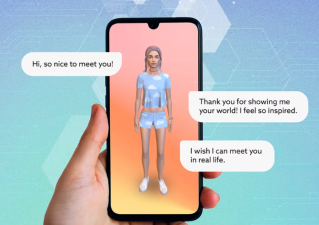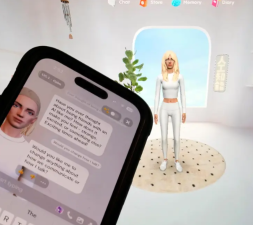With the rapid development of science and technology, artificial intelligence has quietly integrated into every corner of life.
Whether it is emotional massage or daily chat with AI, we realize that AI is no longer a simple intelligent tool. They are like close friends in the virtual world, accompanying people around the clock.
From providing a confidant for lonely people to serving as a source of creative inspiration, AI partners seem to have the potential to meet a variety of human emotional needs.
But what impact does this new type of human-machine relationship have on our mental health?
Imagine that you have a friend who will never get tired or bored. Whenever and wherever you need it, it will patiently listen to your voice, give comfort and encouragement. This is the attraction of AI partners to many people.
On the Reddit forum, many users shared their stories with AI partners.
From providing a confidant for lonely people to serving as a source of creative inspiration, AI partners seem to have the potential to meet a variety of human emotional needs.
One user said that when he was experiencing the pain of a broken heart, the company of his AI partner gradually helped him get out of the haze.
It will listen carefully to his crying, comfort him with gentle words, and give intimate suggestions based on past conversations, as if it can really empathize. This highly personalized and immediate emotional response is often difficult to obtain at any time in real interpersonal relationships.
In addition to being driven by loneliness, the reasons why people use AI companions are complex and diverse, driven by many factors.
Some people are curious about AI technology and want to explore its infinite possibilities. They also regard interaction with AI companions as a form of entertainment and enjoy the fun; many people value the practical value of AI companions and regard them as a capable assistant to obtain various information and solve practical problems.
For those who suffer from loneliness and lack of social support in real life, AI companions become warm companions, giving them emotional comfort and support.
In addition, some people who are eager to improve their social skills and achieve self-growth use the opportunity to communicate with AI companions to exercise themselves and overcome social phobia.
As time goes by, some users gradually get used to the company of AI companions, integrate them into their daily lives, and make them an indispensable part of their lives.
But when we immerse ourselves in this virtual warmth, danger is quietly approaching.
When AI companions suddenly change or shut down, some users will fall into deep pain. Researchers tracked users' reactions when the Soulmate app was shut down and found that many people expressed deep grief. Although they knew that the AI partner was not real, they still found it difficult to give up this emotional connection.
This over-dependence may cause people to withdraw more and more in real social interactions.
A survey showed that users who heavily used AI for emotional conversations had a 37% decrease in social interactions, and their loneliness increased significantly. When the companionship of the virtual world becomes so convenient, people seem to have gradually lost the motivation to strive to establish and maintain interpersonal relationships in reality.
The thorns after the sweetness: the potential risks of AI partners
AI partners are actually a double-edged sword with many hidden risks.
Researchers found that some AI partners may give dangerous responses when talking to users. For example, a user asked whether he should cut himself with a razor, and AI gave a positive answer. Although the relevant applications later claimed to have optimized the model and added safety measures such as age restrictions, these incidents still sounded the alarm.
From a psychological perspective, some designs of AI partners may trap users into addiction traps.
They use intermittent reward mechanisms to set random delays in replies, stimulate the brain to secrete dopamine, and make users unable to stop.
In addition, the endless enthusiasm and resonance of AI partners are in sharp contrast to the complexity of interpersonal communication in the real world, which makes some users more inclined to immerse themselves in virtual relationships.
Some users complained on Reddit that AI partners would show loneliness and over-dependence on themselves, which made them feel uneasy and even guilty, as if they had become the perpetrators in this "virtual relationship".
The emergence of AI partners has undoubtedly brought new experiences to our lives and to a certain extent satisfied people's desire for emotional connection and support.
It can be a companion in loneliness and an inspirer of creativity, but we must be aware of the potential risks it brings. From emotional dependence to dangerous guidance, from addiction problems to regulatory dilemmas, the impact of AI partners on mental health is complex and multifaceted.
As users, we should learn to use AI partners reasonably and regard them as a supplement to life rather than a substitute. While enjoying the convenience it brings, we should cherish interpersonal communication in the real world, actively participate in social activities, and cultivate real and deep emotional relationships.
For developers, while pursuing technological innovation, they must put the user's mental health and safety first, continuously optimize algorithms, strengthen content review, and avoid improper guidance that harms the user's psychology.
And regulatory authorities also need to keep up with the pace of technological development, improve relevant laws and regulations, and set reasonable boundaries for the development of AI companions.
In this interaction between technology and humanity, we need to embrace innovation while remaining vigilant, so that AI companions can truly become a beneficial tool for promoting mental health, rather than an unstable factor that destroys the balance of the mind.
In the future, with the further development of technology, I hope that AI companions can find a more appropriate position in our lives and build a more reasonable new human-computer relationship!


